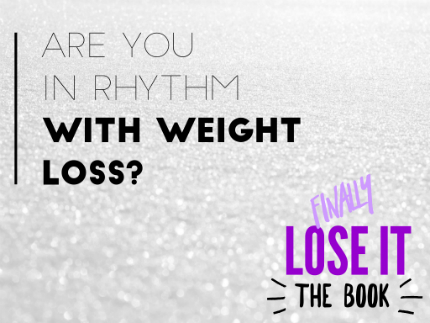If I were to ask you to list the biggest contributors to weight loss resistance what would you say? Diet, physical activity, stress, gut health, sleep? These are the five most common responses I hear, and they’re right! There is one more that’s missing from this list and it’s an element that I outline in detail in my book, Finally Lose It. It’s circadian rhythm – the aspect of health that is never talked about but can be the number one cause of weight loss resistance in women.
What is circadian rhythm?
The circadian rhythm is your body’s internal 24-hour clock. When it is working well, it knows when you should be awake, when you should be asleep, when to burn fat, and when to store fat. Working with your body’s internal rhythm is one of the most foundational concepts of the Finally Lose It Program. If your body doesn’t know when to sleep, when to make digestive juices, when to clean up your immune system, and when to reset your metabolism, then your body becomes a construction crew without a foreman. It is in a state of chaos, and your goals to build a healthier body just go down the tubes. It is influenced by different signals, such as light and dark cycles, food intake, and periods of movement and exercise. This all might sound complicated and overwhelming, but the most important point to take away from this is that there are things we can do to ensure our circadian rhythm is working properly.
How does circadian rhythm relate to weight loss resistance?
If you were on the perfect circadian cycle (which few people are in the Western world), you would be hungry only when your body needed food and without cravings; you would have low environmental stress levels; you would sleep soundly and wake refreshed; you would have low levels of inflammation and resist premature aging; and you would have harmonious fat burning. Is it safe to assume this doesn’t sound familiar to you?
I want you to really get in tune with the current state of your circadian rhythm so that you know how to get it to start working with you, not against you. Here are a few questions to get you started:
- Approximately what time would you get up if you were entirely free to plan your day?
- Approximately what time would you go to bed if you were entirely free to plan your evening?
- If you usually have to get up at a specific time in the morning, how much do you depend on an alarm clock?
- How easy do you find it to get up in the morning (when you are not awakened unexpectedly)?
- How alert do you feel during the first half hour after you wake up in the morning?
- How hungry do you feel during the first half hour after you wake up?
- If you had no commitments the next day, what time would you go to bed compared to your usual bedtime?
- At approximately what time in the evening do you feel tired, and, as a result, in need of sleep?
- Suppose you can choose your own work hours. Assume that you work a five-hour day (including breaks), your job is interesting, and you are paid based on your performance. At approximately what time would you choose to begin?
- At approximately what time of day do you usually feel your best?
- One hears about “morning types” and “evening types.” Which one of these types do you consider yourself to be?
If you identified as someone who thrives in the morning then you may be in luck. Research shows that ‘evening people’ are more likely to gain weight and have a harder time losing it.
Now that you have a little checklist of what to pay attention to and monitor, I want you to be mindful of how you feel when these things change. Maybe you can try to get to bed a bit earlier or maybe you try to avoid stimulating electronics before bed. These things will not only improve your sleep but also improve your hormones and help you lose those stubborn last few pounds. You can find a more in-depth analysis of your circadian rhythm in my book Finally Lose It. There is a quiz where you can find out how the current state of your circadian rhythm is affecting your health. After you take it comment below and let me know what your results are!

